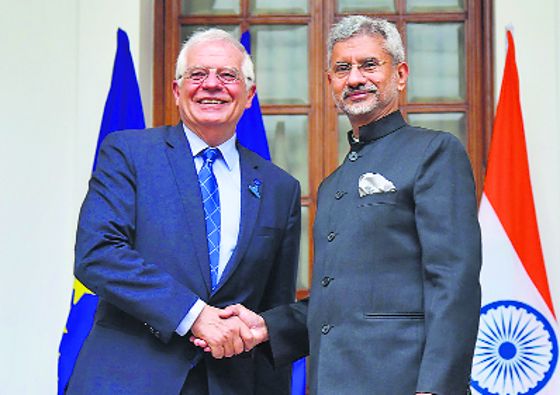
Put off, for now: But, there is much in the EU’s draft resolutions to annoy Delhi.
Tara Kartha
Tara Kartha
Former Director, National Security Council Secretariat
TO most people, the fact that the European Parliament was preparing to table a resolution against India on the Citizenship Amendment Act (CAA) would be more than puzzling. They would wonder what business it is of Europeans to pronounce judgement on what a democratically elected government chooses to do, and that too after a full vote in Parliament. In the event, it seems that better sense in European political circles and some deft footwork by the Indian mission in Brussels has led to a postponement of the resolution to its plenary in late March. By then, the EU Summit, which Prime Minister Modi is slated to attend, would be well over.
But a resolution even after that visit would be damaging. Reports indicate that External Affairs Minister S Jaishankar will be leading the charge against any such possible damage.
There is much in the EU’s five draft resolutions to annoy Delhi. Some indicate not just poor knowledge while others verge on the ridiculous. One draft resolution, for instance, wants to know why India cannot offer citizenship to the Hazaras, Ahmadis, Rohingyas, Biharis Muslims, and the Sri Lankan Tamil community, among others. No doubt, all of these are deserving of shelter in a country that has traditionally placed no bar on incoming refugees or even migrants. But refuge is one thing. Citizenship is another.
Another resolution is alarmist in the extreme, warning of the CAA being "dangerously divisive and … potentially create the largest statelessness crisis in the world and cause widespread human suffering."
A third is far more moderate and records that the Act actually fast-tracks the citizenship process for migrants and refugees. But even this warns that religious discrimination is likely to be counter-productive. There are also calls for visits from UN Special Rapporteur(s) on the right to freedom of opinion and expression, peaceful assembly and such like.
Some, rather more dangerously, demand that any EU trade agreement “include a strong human rights clause with an effective implementation and suspension mechanism.”
Another wades into the Kashmir issue, calling for the implementation of the Security Council resolutions.
It is not hard to see where the mischief originates. Among the prime movers is Pakistan-origin Parliamentarian Shaffaq Mohammad, and a group from the UK which is fast becoming a strong ally of Islamabad. That is unsurprising, given its rising Pakistani population. This group of 73 will, however, exit the body following Brexit which should allay Delhi’s fears.
But a Pakistani hand doesn’t entirely explain why sponsors span political groupings from all sides and includes 626 of the 751-member group. The EU Parliament (EUP) is traditionally strong on the human rights issue, with a 2012 Strategic Framework on Human Rights and Democracy outlining the principles it expects missions to mainstream into policy. These 'guidelines' are, however, not legally binding. That's how much of the EUP's work is done: with recommendations and dialogue.
But it's not just another talk shop. The 2009 Lisbon Treaty gave it budgetary powers, and it elects the head of the European Commission, the main executive body of the EU. It also has the mandate to debate the EU’s relations with other states. In October 2019, EU lawmakers demanded sanctions against Turkey due its actions in Syria on the basis of human rights violations. Ankara protested, but the point is that a month later, the EU did impose sanctions — but for Turkey’s drilling activities near Cyprus. Parliament MPs may respond to human rights issues, but the hard-headed European Union itself responds to more economic concerns. Also, EU lawmakers have responded controversially against their own members. The UK’s Brexit moves led to a resolution that supported the rights of 1.8 million Irish citizens, who are entitled to EU-mandated rights. That’s sticky for the UK.
India could well point out that the resolution comes at a time when EU countries are themselves limiting citizenship even on the basis of birth or ‘jus soli’. The UK does not grant citizenship to foreigners on that basis and France retracted it in 2003. Ireland was the last to do so as Europe as a whole girded itself against an invasion of refugees.
Then there’s the moral angle. These refugees have come from wars in Syria, Iraq and Yemen, where Europe has been involved in directly or indirectly. Some like France have been active participants. Others provided the all-important weaponry. For instance, arms exports from Finland, Sweden, the UK and Germany assisted the Saudis in their war in Yemen. That war, which left some 22 million in desperate need, has been judged by the UN as a severe humanitarian crisis. That leaves the EU in violation of its own laws.
The EU has the ‘Council Common Position’ which lays human rights and other criteria on arms exports. And that’s legally binding.
Europe’s ‘refugee crisis’ was engendered by the arrival of one million in 2015, reducing sharply since then to less than half that number. These figures have been steadily reducing due to, among other things, a vote to stop search and rescue operations of hapless refugees fleeing the devastation, ensuring that NGOs don’t use their own funds to facilitate the movement of these desperate people, and partnering with countries like Libya to prevent their crossing.
In 1971, India took in eight million refugees. That is one issue that lies at the origin of the citizenship controversy. In sum, therefore, there is little legal or moral ground for the Europeans to comment on India’s actions.
But here's the thing. In Europe, there are strict rules on the use of force by law enforcers, and even stricter courts that will examine rules and constitutional amendments for the least infringement of civil rights.
Our record during the present protests bears scrutiny. Delhi should certainly tell off the EU for its unwarranted interference. But it would also be advised to do the sums to see whether this controversial legislation — which, according to the government at least has nothing to do with religion — is really worth the internal and external headache. That math should also conclude whether a reputation as a vibrant and multi-religious country has a monetary value. Pakistan seems to think it does. It has been trying to do in our economy in for years. The Mumbai attacks were just that.
Join Whatsapp Channel of The Tribune for latest updates.




























